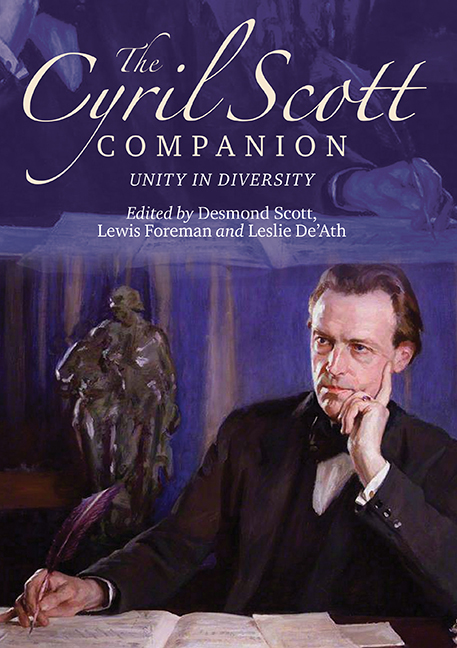Book contents
- Frontmatter
- Dedication
- Contents
- List of Illustrations
- List of Tables
- List of Contributors
- Foreword
- Preface
- Acknowledgements
- Editors' Note
- I SCOTT IN CONTEXT
- 1 From Frankfurt with Love: Friendships Observed through Correspondence and Reminiscence
- 2 Cyril Scott, Debussy and Stravinsky
- 3 Cyril Scott and the BBC
- 4 A Contemporary Composer's View of Cyril Scott's Music: ‘The Subtle Composer of the Prize-Winning Overture’
- 5 ‘Music for the Martians’: Scott's Reception and Reputation at Home and Abroad
- 6 Rose Allatini: Theme and Variations
- 7 Memories of the Man I Barely Knew
- II THE MUSIC
- III THE WRITINGS
- IV PERSONAL REMINISCENCES
- APPENDICES
- CATALOGUES, DISCOGRAPHY AND BIBLIOGRAPHY
- Index of Works
- General Index
2 - Cyril Scott, Debussy and Stravinsky
from I - SCOTT IN CONTEXT
Published online by Cambridge University Press: 14 September 2019
- Frontmatter
- Dedication
- Contents
- List of Illustrations
- List of Tables
- List of Contributors
- Foreword
- Preface
- Acknowledgements
- Editors' Note
- I SCOTT IN CONTEXT
- 1 From Frankfurt with Love: Friendships Observed through Correspondence and Reminiscence
- 2 Cyril Scott, Debussy and Stravinsky
- 3 Cyril Scott and the BBC
- 4 A Contemporary Composer's View of Cyril Scott's Music: ‘The Subtle Composer of the Prize-Winning Overture’
- 5 ‘Music for the Martians’: Scott's Reception and Reputation at Home and Abroad
- 6 Rose Allatini: Theme and Variations
- 7 Memories of the Man I Barely Knew
- II THE MUSIC
- III THE WRITINGS
- IV PERSONAL REMINISCENCES
- APPENDICES
- CATALOGUES, DISCOGRAPHY AND BIBLIOGRAPHY
- Index of Works
- General Index
Summary
DURING the heyday of his fame, between 1905 and 1925, Cyril Scott enjoyed an international reputation as a musical modernist, to a greater extent than any of his English contemporaries. Throughout his lifetime he was probably better known, and certainly more highly esteemed, abroad, particularly in France and Germany, than in his own country. This situation arose in the first place from personal contacts. His composition teacher at Frankfurt, Iwan Knorr, was greatly respected, and continued to speak with admiration and affection for his one-time student. Scott also enjoyed the friendship and patronage of the poet Stefan George, a major figure in German literature, and to whose influence was due the premiere of Scott's First Symphony, at Darmstadt in 1900. Meanwhile, in Austria he benefited from the admiration of Alma Mahler (the wife, then widow, of the great composer), who greatly admired the Violin Sonata of 1908 and secured performances of some of his orchestral works in Vienna. Of Scott's friendship with his French contemporaries Debussy and Ravel I shall speak below.
In England, in contrast, his major works were largely forgotten after their not very frequent premieres. But this was balanced by the popularity of his short piano pieces among those who took an interest in the latest musical developments. These pieces had the great advantage that most of them were easy to play, while the piano pieces being written at this time by Debussy and Ravel were too difficult for amateur pianists. Scott's piano music is likely to have played a major role in popularising the ‘new harmony’ that (with the political help of World War 1) brought to an end the dominance of English musical life by nineteenth-century German Romanticism. But though this emphasis on Scott the modernist stimulated interest in his music while he was still a member of the avant-garde, it did his standing no good when, from the mid-1920s, musical fashions changed drastically. Scott's music now sounded dated. Those with an interest in modern music turned their gaze elsewhere, to newer gods.
Particularly damaging to Scott's reputation was the sobriquet he had acquired of the ‘English Debussy’. For one thing, Debussy's standing was not at all as high a century ago as it is today.
- Type
- Chapter
- Information
- The Cyril Scott CompanionUnity in Diversity, pp. 39 - 48Publisher: Boydell & BrewerPrint publication year: 2018



